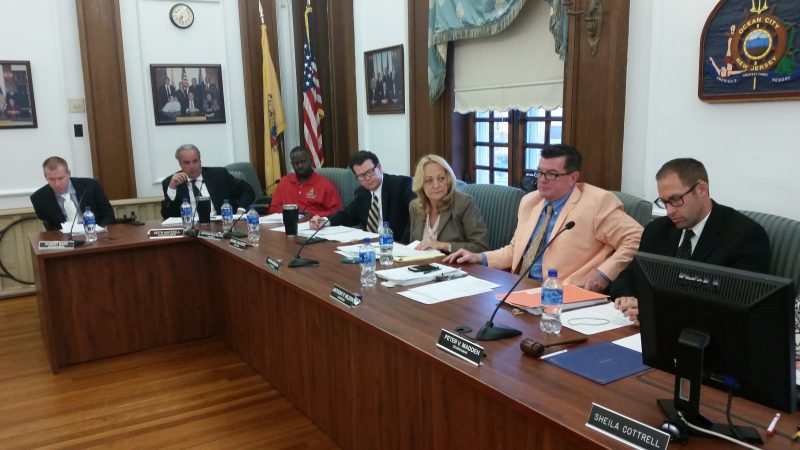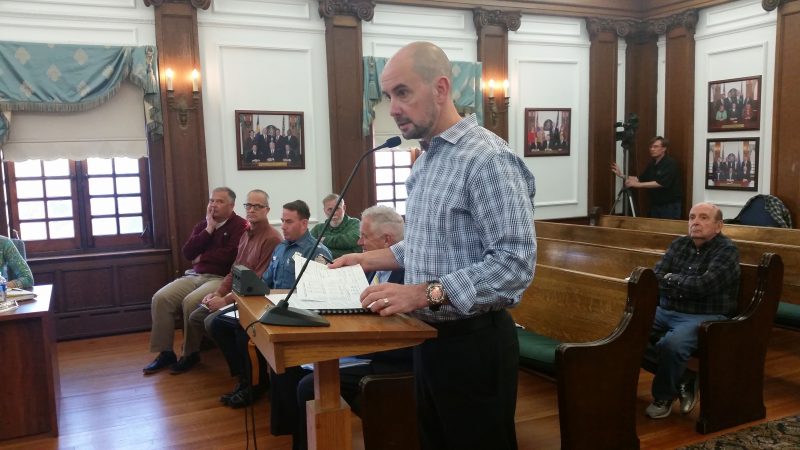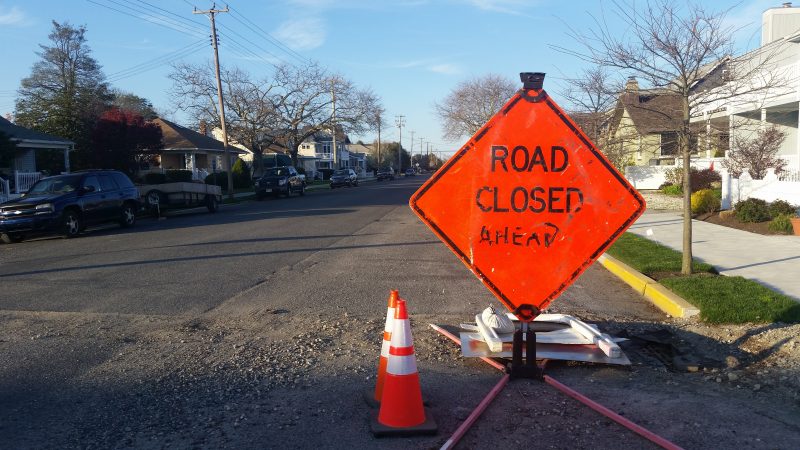Construction work will cause a detour on West Avenue at 41st Street beginning Sept. 24.
 By Donald Wittkowski
By Donald Wittkowski
City Council on Thursday night approved a $78.8 million municipal budget that continues Mayor Jay Gillian’s push for capital projects to upgrade Ocean City’s critical, but aging infrastructure through a series of new road and drainage improvements.
The 2018 spending plan raises the local tax rate by a penny, adding an extra $50 in local taxes per year to a home assessed at $500,000. The figure does not include county and school taxes, which are assessed separately.
“We’re going to make it as smooth as we can to the taxpayers,” Frank Donato, the city’s chief financial officer, said while explaining the tax implications during a presentation on the budget to Council.
Overall, the new budget is essentially flat compared to the 2017 municipal spending plan. However, the city will pay about $750,000 more in 2018 for debt and capital costs, Donato said.
State-mandated increases in the city’s pension fund contributions make up a $300,000 spending increase, according to a budget summary.
Donato also cited nearly $200,000 in legal expenses related to a court award in an age-discrimination lawsuit involving a former city lifeguard as another area where the budget increased for 2018.

Frank Donato, the city's chief financial officer, explains the budget during a presentation to the Council members.
The Council members approved the budget by a 7-0 vote. They said they regret having to raise taxes, even by a penny, but stressed that the budget reflects the desire of local residents for more capital improvements in their neighborhoods.
“Now, some of the bill is due. We have to pay for it,” Councilman Bob Barr said of the impact of the capital plan on the tax rate.
Barr said when he knocked on the doors of 3,000 homeowners during his 2016 election campaign, residents made it clear to him that they wanted more road and drainage projects to help ease the barrier island’s flooding problems.
Councilman Keith Hartzell, who has been on the governing body since 2006 and is the longest-serving member, said of all the municipal budgets he has handled over the years, he is “proudest” of the one for 2018.
Spending for salaries and wages of city employees is down by $212,700 in 2018, a key indicator of just how lean the budget really is, Hartzell said. At the same time, the budget includes a “phenomenal” capital plan, he added.
“They want the infrastructure fixed. That’s what we’re doing,” Hartzell of local residents.

"Road Closed" signs are familiar throughout town as street and drainage projects move forward under the city's capital-improvement program.
On Feb. 8, Council approved the mayor’s $100 million, five-year capital plan, a sweeping blueprint for construction projects that will span from the beaches to the Boardwalk to the bay. The capital plan calls for $38.7 million worth of projects in 2018 alone, including new roadway construction and drainage improvements to reduce flooding.
This year, major road and drainage upgrades will target flooding that occurs from 26th to 34th streets, between West Avenue and Bay Avenue. The city is also building a new drainage project in flood-prone neighborhoods from Second Street to Eighth Street, between West Avenue and the bay.
Gillian did not comment on the budget Thursday during the Council meeting, but he previously said that the array of new capital improvements will pay dividends as the city looks to make itself even more appealing to residents and tourists.
Gillian is seeking his third term in the May 8 municipal election. His mayoral opponent, former City Councilman John Flood, sat in the audience during Thursday’s Council meeting, but did not speak during the public comment session.
In addition to road and drainage construction, the mayor’s capital program has focused on beach replenishment projects, the Boardwalk’s reconstruction and the dredging of the shallow back bays. On Saturday at 10 a.m., Gillian will hold a town meeting at the Ocean City Tabernacle to announce the locations of the 2018 dredging program.
The city’s growing tax base will help underwrite the budget and capital costs. The ratable base has increased by about $136 million compared to 2017 and now totals nearly $11.7 billion, a good sign of the city’s financial strength, city officials say. The ratable base is the combined value of all taxable real estate.
The budget anticipates $53.6 million in tax revenue. In addition to local property taxes, the city has the ability to tap other sources of revenue to help finance the budget. Beach tag sales and parking operations are two of the biggest revenue generators. The budget forecasts $4 million in beach tag sales and $3 million in parking revenue for 2018.
 By Donald Wittkowski
City Council on Thursday night approved a $78.8 million municipal budget that continues Mayor Jay Gillian’s push for capital projects to upgrade Ocean City’s critical, but aging infrastructure through a series of new road and drainage improvements.
The 2018 spending plan raises the local tax rate by a penny, adding an extra $50 in local taxes per year to a home assessed at $500,000. The figure does not include county and school taxes, which are assessed separately.
“We’re going to make it as smooth as we can to the taxpayers,” Frank Donato, the city’s chief financial officer, said while explaining the tax implications during a presentation on the budget to Council.
Overall, the new budget is essentially flat compared to the 2017 municipal spending plan. However, the city will pay about $750,000 more in 2018 for debt and capital costs, Donato said.
State-mandated increases in the city’s pension fund contributions make up a $300,000 spending increase, according to a budget summary.
Donato also cited nearly $200,000 in legal expenses related to a court award in an age-discrimination lawsuit involving a former city lifeguard as another area where the budget increased for 2018.
By Donald Wittkowski
City Council on Thursday night approved a $78.8 million municipal budget that continues Mayor Jay Gillian’s push for capital projects to upgrade Ocean City’s critical, but aging infrastructure through a series of new road and drainage improvements.
The 2018 spending plan raises the local tax rate by a penny, adding an extra $50 in local taxes per year to a home assessed at $500,000. The figure does not include county and school taxes, which are assessed separately.
“We’re going to make it as smooth as we can to the taxpayers,” Frank Donato, the city’s chief financial officer, said while explaining the tax implications during a presentation on the budget to Council.
Overall, the new budget is essentially flat compared to the 2017 municipal spending plan. However, the city will pay about $750,000 more in 2018 for debt and capital costs, Donato said.
State-mandated increases in the city’s pension fund contributions make up a $300,000 spending increase, according to a budget summary.
Donato also cited nearly $200,000 in legal expenses related to a court award in an age-discrimination lawsuit involving a former city lifeguard as another area where the budget increased for 2018.
 Frank Donato, the city's chief financial officer, explains the budget during a presentation to the Council members.
The Council members approved the budget by a 7-0 vote. They said they regret having to raise taxes, even by a penny, but stressed that the budget reflects the desire of local residents for more capital improvements in their neighborhoods.
“Now, some of the bill is due. We have to pay for it,” Councilman Bob Barr said of the impact of the capital plan on the tax rate.
Barr said when he knocked on the doors of 3,000 homeowners during his 2016 election campaign, residents made it clear to him that they wanted more road and drainage projects to help ease the barrier island’s flooding problems.
Councilman Keith Hartzell, who has been on the governing body since 2006 and is the longest-serving member, said of all the municipal budgets he has handled over the years, he is “proudest” of the one for 2018.
Spending for salaries and wages of city employees is down by $212,700 in 2018, a key indicator of just how lean the budget really is, Hartzell said. At the same time, the budget includes a “phenomenal” capital plan, he added.
“They want the infrastructure fixed. That’s what we’re doing,” Hartzell of local residents.
Frank Donato, the city's chief financial officer, explains the budget during a presentation to the Council members.
The Council members approved the budget by a 7-0 vote. They said they regret having to raise taxes, even by a penny, but stressed that the budget reflects the desire of local residents for more capital improvements in their neighborhoods.
“Now, some of the bill is due. We have to pay for it,” Councilman Bob Barr said of the impact of the capital plan on the tax rate.
Barr said when he knocked on the doors of 3,000 homeowners during his 2016 election campaign, residents made it clear to him that they wanted more road and drainage projects to help ease the barrier island’s flooding problems.
Councilman Keith Hartzell, who has been on the governing body since 2006 and is the longest-serving member, said of all the municipal budgets he has handled over the years, he is “proudest” of the one for 2018.
Spending for salaries and wages of city employees is down by $212,700 in 2018, a key indicator of just how lean the budget really is, Hartzell said. At the same time, the budget includes a “phenomenal” capital plan, he added.
“They want the infrastructure fixed. That’s what we’re doing,” Hartzell of local residents.
 "Road Closed" signs are familiar throughout town as street and drainage projects move forward under the city's capital-improvement program.
On Feb. 8, Council approved the mayor’s $100 million, five-year capital plan, a sweeping blueprint for construction projects that will span from the beaches to the Boardwalk to the bay. The capital plan calls for $38.7 million worth of projects in 2018 alone, including new roadway construction and drainage improvements to reduce flooding.
This year, major road and drainage upgrades will target flooding that occurs from 26th to 34th streets, between West Avenue and Bay Avenue. The city is also building a new drainage project in flood-prone neighborhoods from Second Street to Eighth Street, between West Avenue and the bay.
Gillian did not comment on the budget Thursday during the Council meeting, but he previously said that the array of new capital improvements will pay dividends as the city looks to make itself even more appealing to residents and tourists.
Gillian is seeking his third term in the May 8 municipal election. His mayoral opponent, former City Councilman John Flood, sat in the audience during Thursday’s Council meeting, but did not speak during the public comment session.
In addition to road and drainage construction, the mayor’s capital program has focused on beach replenishment projects, the Boardwalk’s reconstruction and the dredging of the shallow back bays. On Saturday at 10 a.m., Gillian will hold a town meeting at the Ocean City Tabernacle to announce the locations of the 2018 dredging program.
The city’s growing tax base will help underwrite the budget and capital costs. The ratable base has increased by about $136 million compared to 2017 and now totals nearly $11.7 billion, a good sign of the city’s financial strength, city officials say. The ratable base is the combined value of all taxable real estate.
The budget anticipates $53.6 million in tax revenue. In addition to local property taxes, the city has the ability to tap other sources of revenue to help finance the budget. Beach tag sales and parking operations are two of the biggest revenue generators. The budget forecasts $4 million in beach tag sales and $3 million in parking revenue for 2018.
"Road Closed" signs are familiar throughout town as street and drainage projects move forward under the city's capital-improvement program.
On Feb. 8, Council approved the mayor’s $100 million, five-year capital plan, a sweeping blueprint for construction projects that will span from the beaches to the Boardwalk to the bay. The capital plan calls for $38.7 million worth of projects in 2018 alone, including new roadway construction and drainage improvements to reduce flooding.
This year, major road and drainage upgrades will target flooding that occurs from 26th to 34th streets, between West Avenue and Bay Avenue. The city is also building a new drainage project in flood-prone neighborhoods from Second Street to Eighth Street, between West Avenue and the bay.
Gillian did not comment on the budget Thursday during the Council meeting, but he previously said that the array of new capital improvements will pay dividends as the city looks to make itself even more appealing to residents and tourists.
Gillian is seeking his third term in the May 8 municipal election. His mayoral opponent, former City Councilman John Flood, sat in the audience during Thursday’s Council meeting, but did not speak during the public comment session.
In addition to road and drainage construction, the mayor’s capital program has focused on beach replenishment projects, the Boardwalk’s reconstruction and the dredging of the shallow back bays. On Saturday at 10 a.m., Gillian will hold a town meeting at the Ocean City Tabernacle to announce the locations of the 2018 dredging program.
The city’s growing tax base will help underwrite the budget and capital costs. The ratable base has increased by about $136 million compared to 2017 and now totals nearly $11.7 billion, a good sign of the city’s financial strength, city officials say. The ratable base is the combined value of all taxable real estate.
The budget anticipates $53.6 million in tax revenue. In addition to local property taxes, the city has the ability to tap other sources of revenue to help finance the budget. Beach tag sales and parking operations are two of the biggest revenue generators. The budget forecasts $4 million in beach tag sales and $3 million in parking revenue for 2018.